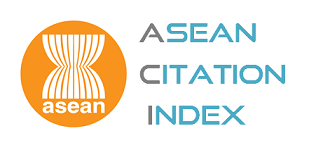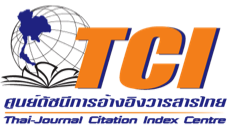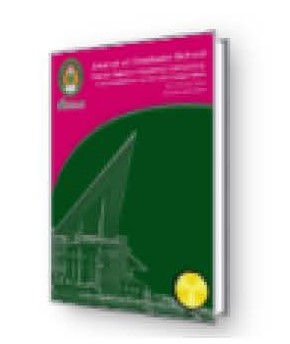การพัฒนารูปแบบการเรียนการสอนตามทฤษฎีการสร้างความรู้เพื่อส่งเสริมความสามารถในการทำโครงงานและการแก้ปัญหาของนักเรียนชั้นมัธยมศึกษาตอนต้น
Abstract
การพัฒนารูปแบบการเรียนการสอนตามทฤษฎีการสร้างความรู้เพื่อส่งเสริมความสามารถในการทำโครงงานและการแก้ปัญหาของนักเรียนชั้นมัธยมศึกษาตอนต้น
THE DEVELOPMENT OF LEARNING PATTERN WITH CONSTRUCTIVIST THEORY FOR SUPPORTING ABILITY IN PROJECT WORKING AND PROBLEM SOLVING OF LOWER SECONDARY STUDENTS
บทคัดย่อ
การวิจัยครั้งนี้มีความมุ่งหมาย 1) เพื่อพัฒนาและหาประสิทธิภาพของรูปแบบการเรียนการสอนตามทฤษฎีการสร้างความรู้เพื่อส่งเสริมความสามารถในการทำโครงงานและการแก้ปัญหาของนักเรียนชั้นมัธยมศึกษาตอนต้น และ 2) เพื่อศึกษาประสิทธิผลเชิงประจักษ์ของรูปแบบการเรียนการสอนตามทฤษฎีการสร้างความรู้เพื่อส่งเสริมความสามารถในการทำโครงงานและการแก้ปัญหาของนักเรียนชั้นมัธยมศึกษาตอนต้น กลุ่มตัวอย่าง ได้แก่ นักเรียนชั้นมัธยมศึกษาปีที่ 2/3 ภาคเรียนที่ 1 ปีการศึกษา 2557 โรงเรียนบัวขาว อำเภอกุฉินารายณ์ จังหวัดกาฬสินธุ์ จำนวน 45 คน ได้มาโดยการสุ่มแบบกลุ่ม (Cluster Random Sampling) เครื่องมือที่ใช้ในการวิจัยประกอบด้วย รูปแบบการเรียนการสอนตามทฤษฎีการสร้างความรู้เพื่อส่งเสริมความสามารถในการทำโครงงานและการแก้ปัญหาของนักเรียนชั้นมัธยมศึกษาตอนต้น แผนการจัดการเรียนรู้ แบบทดสอบ วัดผลสัมฤทธิ์ทางการเรียน แบบวัดความสามารถในการแก้ปัญหา แบบประเมินความสามารถในการทำโครงงาน และแบบวัดความพึงพอใจ การวิเคราะห์ข้อมูลโดยใช้สถิติ ร้อยละ ค่าเฉลี่ย ส่วนเบี่ยงเบนมาตรฐาน ทดสอบสมมติฐานใช้ t-test ชนิด Dependent Samples และวิเคราะห์เนื้อหา
ผลการวิจัยปรากฏผล ดังนี้
1. รูปแบบการเรียนการสอนตามทฤษฎีการสร้างความรู้เพื่อส่งเสริมความสามารถในการทำโครงงานและ
การแก้ปัญหาของนักเรียนชั้นมัธยมศึกษาตอนต้น ผ่านการตรวจสอบประสิทธิภาพโดยผู้เชี่ยวชาญมีชื่อเรียกว่า PACSE Model
มีองค์ประกอบ คือ หลักการ วัตถุประสงค์ กระบวนการเรียนการสอน สาระความรู้ สิ่งที่ส่งเสริมการเรียนรู้ ระบบสังคม หลักการตอบสนอง และระบบสนับสนุน ในขั้นกระบวนการเรียนการสอนมี 5 ขั้นตอน ประกอบด้วย 1) ขั้นเตรียมความพร้อมสำหรับการเรียนรู้ (Preparation : P) 2) ขั้นปฏิบัติการเรียนรู้ (Action of Learning : A) 3) ขั้นสร้างความรู้ (Constructing of Knowledge : C) 4) ขั้นแบ่งปันความรู้ (Sharing of Knowledge : S) และ 5) ขั้นประเมินผล (Evaluation : E) และรูปแบบ
การเรียนการสอนมีประสิทธิภาพเท่ากับ 82.66/81.24 ซึ่งเป็นไปตามเกณฑ์ที่กำหนดไว้
2. ผลการทดลองใช้รูปแบบการเรียนการสอนที่พัฒนาขึ้น พบว่า นักเรียนมีผลสัมฤทธิ์ทางการเรียนหลังเรียน สูงกว่าก่อนเรียนอย่างมีนัยสำคัญทางสถิติที่ระดับ .01 นักเรียนมีความสามารถในการแก้ปัญหาหลังเรียนสูงกว่าก่อนเรียนอย่างมีนัยสำคัญทางสถิติที่ระดับ .01 นักเรียนมีความสามารถในการทำโครงงาน โดยภาพรวมอยู่ในระดับดี ความพึงพอใจของนักเรียนที่มีต่อการจัดการเรียนการสอนตามรูปแบบการเรียนการสอนตามทฤษฎีการสร้างความรู้เพื่อส่งเสริมความสามารถในการทำโครงงานและการแก้ปัญหาของนักเรียนชั้นมัธยมศึกษาตอนต้น โดยภาพรวมอยู่ในระดับมากที่สุด
ABSTRACT
The aims of this research were: 1) to develop and verify the efficiency of instructional model based on constructivist theory to enhance in project working and problem solving abilities of lower secondary students. 2) to study the effectiveness of instructional model based on constructivist theory to enhance in project working and problem solving abilities of lower secondary students. The samples were 45 Mattayomsuksa 2/3 students, the first semester , academic year 2014 at Buakhao school, the district of Kuchinarai, Kalasin Province, selected through cluster random sampling. The research tools were instructional model based on constructivist theory to enhance in project working and problem solving abilities of lower secondary students, lesson plans, achievement test, problem solving test, project working abilities test and questionnaire. The data were analyzed by using percentage, mean, standard deviation, dependent t-test dependent and content analysis.
The results of the research were as follows :
1. The instructional model based on constructivist theory to enhance in project working and problem solving abilities of lower secondary students was examined by the specialists called PACSE Model with principles, objectives, syntax, contents, nurturing effects social system, principle of reacting and support system. There were 5 steps of syntax as follows : 1) Preparation : P 2) Action of learning : A 3) Constructing of knowledge : C 4) Sharing of knowledge : S 5) Evaluation : E. The efficiency of instructional model based on constructivist theory to enhance in project working and problem solving abilities of lower secondary students was 82.66/81.24 which was as the expected criteria.
2. The results study the effectiveness of the developed instructional model found that the post-learning achievement was significantly higher than pre-learning at the .01 level. The ability of students in solving problems of post-learning was significantly higher than pre-learning at the .01 level. The students’ ability in project working in general was in “good level”. The satisfaction of students to the teaching by using instructional model based on constructivist theory to enhance in project working and problem solving abilities of lower secondary students, in general was in “the most level”.
Downloads
How to Cite
Issue
Section
License
บทความทุกบทความที่ตีพิมพ์ในวารสารบัณฑิตศึกษา มหาวิทยาลัยราชภัฏสกลนคร ถือว่าเป็นลิขสิทธิ์ของบัณฑิตวิทยาลัย มหาวิทยาลัยราชภัฏสกลนคร









